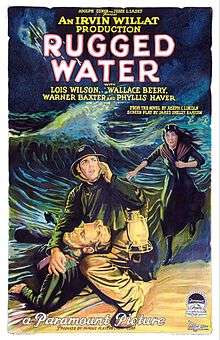Rugged Water
Rugged Water is a 1925 American drama silent film directed by Irvin Willat and written by James Shelley Hamilton and Joseph C. Lincoln. The film stars Lois Wilson, Wallace Beery, Warner Baxter, Phyllis Haver, Dot Farley, J. P. Lockney, James Mason and Willard Cooley. The film was released on August 17, 1925, by Paramount Pictures.[1][2]
| Rugged Water | |
|---|---|
 Film poster | |
| Directed by | Irvin Willat |
| Produced by | Jesse L. Lasky Adolph Zukor |
| Screenplay by | James Shelley Hamilton |
| Based on | novel by Joseph C. Lincoln |
| Starring | Lois Wilson Wallace Beery Warner Baxter Phyllis Haver Dot Farley J. P. Lockney James Mason Willard Cooley |
| Cinematography | Alfred Gilks |
Production company | Famous Players-Lasky Corporation |
| Distributed by | Paramount Pictures |
Release date |
|
Running time | 60 minutes |
| Country | United States |
| Language | English |
Plot
A Cape Cod melodrama about the U.S. Life-Saving Service based on a novel by Joseph C. Lincoln. When the captain of the Setauket Life Saving Station retires, the second in command, Calvin Homer (Warner Baxter), expects to be promoted; but the appointment goes instead to Benoni Bartlett (Wallace Beery), a religious fanatic who has been named a hero as the only survivor of dangerous rescue that claimed the lives of his fellow crewmen at a neighboring station. Bartlett's daughter Norma (Lois Wilson)) convinces Homer to stay in spite of her father's antagonistic ways. Soon a romance springs up between the two of them, even though Myra Fuller (Phyllis Haver) had already finagled a proposal out of Homer. Myra, the village vamp, breaks off her engagement to him. When a storm blows, Bartlett's religious fanaticism proves to be nothing but a cover for his cowardice and he refuses to send his crew out to rescue a vessel in distress. Calvin takes the men out and effects the rescue. Bartlett is discharged, and Calvin is appointed to replace him. Driven insane by his experiences, Bartlett ventures out in a small boat in rough water, and Calvin rescues him. The old man dies from exposure, and Norma, having realized that Calvin was not responsible for her father's disgrace, seeks refuge in his strong arms.
Cast
- Lois Wilson as Norma Bartlett
- Wallace Beery as Capt. Bartlett
- Warner Baxter as Calvin Horner
- Phyllis Haver as Myra Fuller
- Dot Farley as Mrs. Fuller
- J. P. Lockney as Supt. Lockney
- James Mason as Wally Oakes
- Willard Cooley as Sam Bearse
- Walter Ackerman as Cook
- Knute Erickson as Jarvis
- Thomas Delmar as Gammon
- Jack Byron as Orrin Hendricks
- Walter Rodgers as Bloomer
- Warren Rogers as Josh Phinney
See also
- Godless Men (1920)
- Stormswept (1923)
- Code of the Sea (1924)
- Sensation Seekers (1927)
- The Perfect Storm (2000)
References
- "Rugged-Water - Trailer - Cast - Showtimes - NYTimes.com". nytimes.com. Retrieved 6 February 2015.
- "Rugged Water". afi.com. Retrieved 6 February 2015.
- The Library of Congress American Silent Feature Film Survival Catalog:Rugged Water
- Rugged Water at Lost Film Files:Paramount lost films - 1925